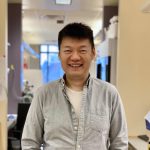 Greg M. Delgoffe, PhD, Director
Greg M. Delgoffe, PhD, Director
Address: Ford Building, 5051 Centre Ave, Suite 4051, Pittsburgh, PA 15213
Email: gdelgoffe@pitt.edu
Admin: Mandy Singh, singhd11@upmc.edu, 412-648-5017
Grad students/postdocs: Actively recruiting graduate students and postdocs to join the team.
Research Interests: The initiation, propagation, and differentiation of an immune response carries immense metabolic demands, and it is now clear that metabolite availability and processing are key mechanisms by which the immune system can be regulated. These are key considerations in anti-cancer immunity, in which an immune response is taking place in an extremely metabolically active tissue. Since its inception, the Delgoffe lab has sought to understand and overcome the metabolic barriers cancer places on anti-tumor immunity, and determine how the metabolic profile of cancer cells may impact responses to immunotherapy. Research from the lab has uncovered that not only is metabolism a central defect in tumor-infiltrating T cells, promoting T cell exhaustion, differentiation into immunosuppressive cell types, and creating barriers to T cell motility, but also a key axis to leverage to support immunotherapeutic response. Indeed, our data suggest all forms of immunotherapy can be improved through metabolic modulation.
In the lab, we explore how adoptive cell therapies, checkpoint blockade, T cell agonist therapy, and oncolytic viruses can be metabolically supported to enhance therapeutic efficacy. This has led not only to a deepened understanding of how the immune system is regulated within the tumor microenvironment, but also several novel clinical trials armed at metabolically arming cancer immunity to support immunotherapeutic responses.
 Abigail Overacre, PhD
Abigail Overacre, PhD
Address: Ford Building, 5051 Centre Ave, Suite 4047, Pittsburgh, PA 15213
Email: overacre@pitt.edu
Admin: Mandy Singh, singhd11@upmc.edu, 412-648-5017
Grad students/postdocs: We are currently looking for excellent graduate students and postdocs to join our team.
Research Interests: The Overacre Lab is interested in how the microbiota:immune system relationship impacts cancer progression and immunotherapeutic response. The gut microbiota is comprised of billions to trillions of various microbes (bacteria, viruses, fungi), and these microbes can directly impact the host immune system, disease, and overall health. Recently, the gut microbiota has been associated with patient response to immunotherapy in cancer.
While we are keenly interested in T cells, we take a holistic approach through imaging and spatial transcriptomics to assess how microbes (found both within the gut and in the tumor itself) impact the tumor microenvironment (TME) as a whole. Using unique tools, we seek to understand how the gut microbiota impacts both microbe- and tumor-specific immune responses, with the ultimate goal of developing novel therapeutics for refractory tumor types.
 Tullia Bruno, PhD
Tullia Bruno, PhD
Address: UPMC Hillman Cancer Center, 5117 Centre Ave, Office 2.18a, Lab 2.19, Pittsburgh, PA 15213
Email: tbruno@pitt.edu
Admin: Renee Mandell, mandellr2@upmc.edu
Grad students/postdocs: Taking grad students for rotation and seeking a postdoc.
Research Interests: Despite the success of anti-PD1 therapy, only 20% of patients produce a durable response to this treatment. Further, there are some solid tumor types, which yield very little therapeutic benefit from current standard of care immunotherapies. Thus, a need exists to develop additional therapeutic strategies to treat these patients, which includes evaluation of other tumor infiltrating immune cells that could further augment the intratumoral CD8+ T cell response. B cells represent a possible target for immunotherapy due to their predominance in the tumor microenvironment (TME) and crucial role in the immune response.
However, B cell function in cancer and in the context of immunotherapy has been understudied. In fact, conclusions on an anti- or pro- tumor role for B cells in the TME remain incomplete. However, in multiple solid tumors, current evidence suggests an anti-tumor role for B cells. Specifically, detection of B cells within tertiary lymphoid structures (TLS) correlates with increased survival and immunotherapeutic response. While B cells have been identified in multiple tumor types, their complete phenotypic signature, function, and interplay with other components within the TME have been understudied.
Further, the complex composition of TLS in patient tumors is severely underappreciated, which is an overt focus of the Bruno laboratory. Specifically, we aim to understand B cell infiltration and TLS development within solid tumors to generate effective B-cell focused immunotherapies to augment the current successes of standard of care immunotherapies such as anti-PD1.
To this end, we take a multi-level approach to understanding B cells and TLS composition in human tumors. Specifically, we transcriptionally assess B cells via single cell RNAseq with paired BCR seq, we interrogate B cell subsets within patient tumors using multi-parameter flow cytometry (15-30 parameters), we locationally evaluate B cells within and outside TLS utilizing multispectral imaging (Vectra Polaris) and spatial transcriptomics (Nanostring GeoMax Digital Spatial Profiler), and we evaluate the function of B cells and their interplay with other important immune cells within the TME via micro-scale in vitro functional assays.
 Yinan Gong, PhD
Yinan Gong, PhD
Address: UPMC Hillman Cancer Center, 5117 Centre Ave, Office 2.26a, Lab 2.19, Pittsburgh, PA 15213
Email: yngong@pitt.edu
Admin: Renee Mandell, mandellr2@upmc.edu
Grad students/postdocs: Taking grad students for rotation and seeking a postdoc.
Research Interests: After decades of cell death study, it is now well accepted that cell death can be highly programmed, including apoptosis and some forms of necrosis. Decoding the cell death pathway has led us to successfully induce, block, and/or predict cell death during embryonic development and many other physiological conditions. Here, at Tumor Microenvironments Center, Hillman Cancer Center, we have the chance to initiate innovative cell death studies in treating cancer, which is always the “holy grail.”
Moving to the new era of cell death research, one of the many fascinating questions to solve is “If a Cell Dies in the Forest of the Body, Does It Make a Sound?” This question means defining the specific “effector responses of cell death” in specific tumor microenvironments (TME). Our current view of cell death responses is not an “one-to-one relationship between the type of cell death and the effector function” anymore. Although we used to believe non-inflammatory cell death is associated with physiological resolution and repair responses, whereas an inflammatory cell death can result in inflammation and infection restriction, the evolved theory is that “the variety of cell death types, the multitude of accompanying environmental signals and their integration by different efferocytes together, execute a specific effector response” (Cited from PMID: 33188303). This is saying the same cell death modality can result in distinct, even opposite, effector functions, depending on the specificity of environments and the efferocytes.
We have the unique opportunity to redirect the TME for anti-tumor therapies by reprograming the cell death machinery in either tumor cells and/or immune cells. Our overall goal is to rewire the cell death pathway to battle with cancer. We are the cell death “programmers”! For more information, visit www.yinangong.com.
 Dario Vignali, PhD
Dario Vignali, PhD
Address: Ford Building, 5051 Centre Ave, Suite 4037, Pittsburgh, PA 15213 [active starting in September] *
Email: dvignali@pitt.edu
Admin: Barb Beatty, beattyb@pitt.edu, 412-624-7935
Grad students/postdocs: Taking grad students for rotation and seeking postdocs.
Research Interests: Dr. Vignali’s research focuses on gaining a better understanding of the inhibitory mechanisms, including inhibitory receptors and regulatory T cells, that limit anti-tumor immunity in cancer and are insufficient in autoimmune disease. He also has discovery-based programs aimed at identifying novel targets for therapeutic intervention. He also works with UPMC Hillman Cancer Center scientists and clinicians to facilitate the translation of novel therapeutic modalities with a focus on immunologically impacted solid tumors (primarily head and neck, melanoma, lung, ovarian, breast). My UPMC Hillman Cancer Center leadership efforts, in part as co-leader of the Cancer Immunology & Immunotherapy Program, are directed toward providing a bridge between basic and transitional cancer immunology. Lastly, he also works extensively with large and start-up biopharmaceutical companies to bring novel therapeutics to the clinic.

 Greg M. Delgoffe, PhD, Director
Greg M. Delgoffe, PhD, Director Abigail Overacre, PhD
Abigail Overacre, PhD Tullia Bruno, PhD
Tullia Bruno, PhD Yinan Gong, PhD
Yinan Gong, PhD Dario Vignali, PhD
Dario Vignali, PhD
